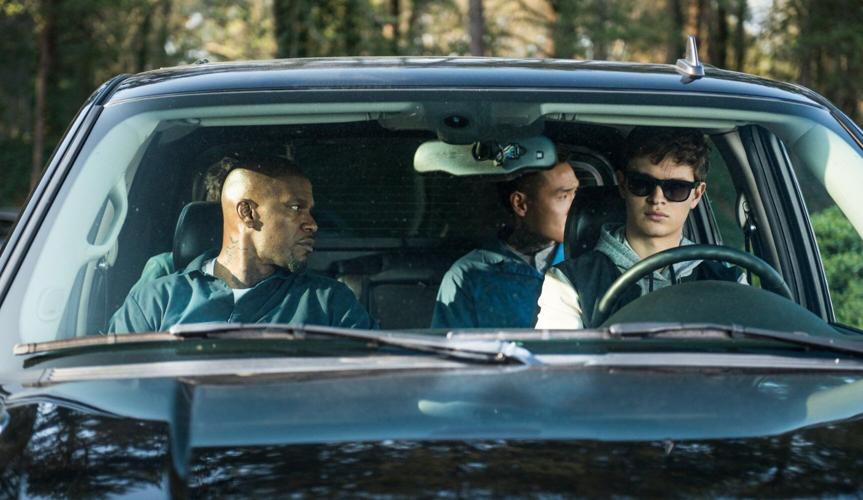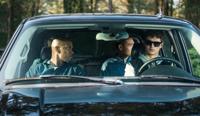This film might have had a stronger impact on me if I hadn’t seen a version of it done earlier this year that did better by its main protagonist and its central story. Eran Creevy’s Collide focuses on a young 20-something, white heterosexual boy involved with a gangster but who is trying to get out of the crime world with there being an emphasis on car chases and in fact car chases being the signature thing about the film. This movie, written and directed by Edgar Wright, is that same thing, except Wright thinks that the cuteness and cool factor of his main actor are enough to carry the whole thing or like Guardians of the Galaxy, Vol. 2, maybe Wright thinks the soundtrack is enough to carry it, which would make this movie more superficial than substantive. Other words, there’s no hook to this story that would make me care on any deeper level.
Ansel Elgort (The Fault in Our Stars and Divergent) stars as Baby, a veritable teenage, getaway driver for a gangster who likes to rob banks. He has tinnitus, which isn’t much of a factor or used to great, narrative effect. It’s merely an excuse for him to have earbuds constantly listening to music on his iPod, one of many mp3 players in his pockets, along with one of many sunglasses in his pockets as well, a factoid that is never explained. He’s the best getaway driver there is, which apparently comes from a childhood of stealing cars following the death of his parents in a horrible car crash. The money he makes he saves to put his elderly foster father in a nursing home.
The obvious comparison would be to Nicolas Winding Refn’s Drive (2011). Wright bests Refn in that his main character isn’t so stoic as to be blank. Refn doesn’t even bother with any real back-story. At least, Wright lets us know how his character came to be. He lets us know what Baby’s passion is. It’s music. It makes Baby more of an anchor than the nameless character, played by Ryan Gosling, in Refn’s ode to the automobile. Yes, Baby is an anchor. Unfortunately, he is an anchor to much of nothing.
Lily James (Cinderella and Pride and Prejudice and Zombies) co-stars as Debora, a waitress in a diner who is the love interest of Baby. Sadly, that’s all there is to her. She’s a pretty object to be dangled. There’s such a thing as love-at-first-sight and people quickly connecting but Wright makes her nothing but a puppy to follow Elgort around. It doesn’t seem like Debora has that many interactions with Baby and what he tells her about his job is so sketchy that it’s a wonder why she doesn’t question it. Why she would then runaway with him based on so little interaction suggests a desperation that doesn’t come across at all.
Even though we spend every scene with Baby, there comes a point where he has to make a choice. Based on what we see, it’s obvious that he’s going to walk away. Yet, he doesn’t, and I don’t understand why, other than the movie would be over and Wright wanted another action sequence. Baby has already expressed contempt or disgust with the violence, especially the murders. He already has enough money saved, so it makes no sense why he would choose to continue with the crime.
In addition to character questions, this movie isn’t that impressive on the car chases. The problem is that car chases are a dime-a-dozen. Almost every action flick has a car chase. Some recent blockbusters that have been praised include Mad Max: Fury Road and Fast Five. Even an animated film like Finding Dory has a crazy car chase. Whether it’s a comic book movie like Captain America: The Winter Soldier, a mid-level flick like Run All Night or it’s a smaller film like Nightcrawler, car chases have become a staple, so it’s difficult to come up with something new and clever to top what’s already been done, especially by greats such as William Friedkin, John Frankenheimer and James Cameron.
Wright doesn’t top any of the aforementioned films. When it comes to car chases, there aren’t even all that many here. Arguably, there are only three and aside from an adrenaline rush and the music, there isn’t much to make me care. Refn’s opening to Drive was impressive for how quiet and calm it was. Wright like most goes for the hyperkinetic approach, which was fine, but, by the end, one loses all rooting interest.
Rated R for language, violence and gore.
Running Time: 1 hr. and 53 mins.
























